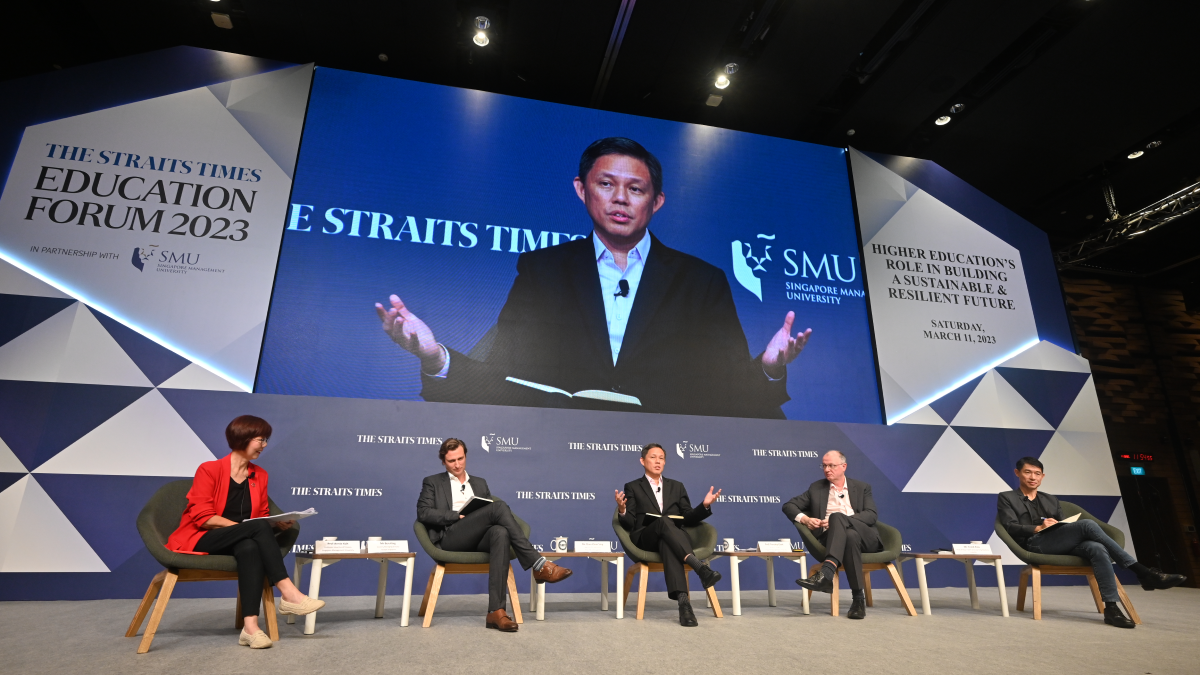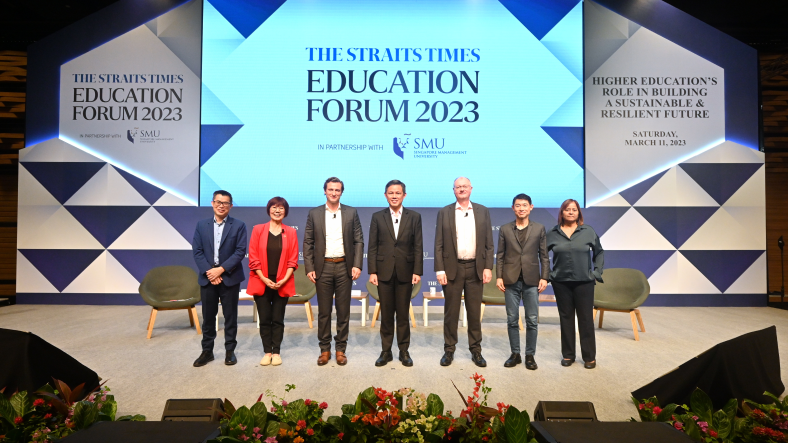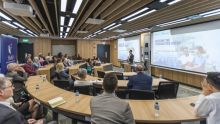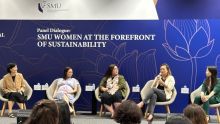The role of higher education in building a sustainable and resilient future

Straits Times Education Forum 2023 in partnership with SMU
Over the course of the last several years, businesses have experienced immense pressure to move towards sustainability practices, and consequently, there is a greater need for individuals with the training and education to help facilitate this transition. With an increased focus on developing green, sustainable, and resilient economies, Institutes of Higher Learning (IHLs) have taken on a key role in helping to nurture and train talent who can help companies meet, and even exceed, their sustainability targets.
While cultivating a pipeline of sustainability talent is essential for our rapidly evolving world, the qualities considered integral to this field are constantly shifting alongside the complex nature of such an endeavour. To provide the tools necessary for success in a fast-moving climate, it is essential that educators equip people with the deep knowledge required to successfully and responsibly navigate sustainability topics.
This was among the issues discussed at the recent Straits Times Education Forum 2023, held on Saturday, 11 March 2023. Themed “Higher education’s role in building a sustainable and resilient future”, the hybrid event was attended by an in-person and virtual audience consisting of more than 300 students and educators from Singapore, ST readers, members of the SMU community as well as SMU overseas partner university representatives.
Multiple pathways to success for a diverse talent pool
Minister for Education Mr Chan Chun Sing kicked-off the forum with a keynote address, in which he expressed the important role that IHLs play in helping to broaden the pathways to success in Singapore.
By moving away from a heavy focus on grades and recognising different aptitudes, as well as providing different pathways to success and different entry points to lifelong learning, a diverse pool of talent is created.
“Diverse talent is needed to cultivate diverse ideas, and to form well-rounded teams that can lead complex organisations to greater heights,” said Mr Chan, going on to urge Singaporeans to think beyond themselves as he talked about sustainability in terms of building lives and livelihoods for their fellow citizens.
“Success should not be defined by personal success,” he asserted, saying that success should be defined by each individuals’ contribution to society, and the well-being of others.
“Every Singaporean is a steward of the world he or she inherits, and must pay it forward to provide more opportunities, access, and networks to those who may be less privileged than us,” he added.
The subject of broadening the definitions in success and opening more pathways were a common theme over course of the two-hour session, which was moderated by SMU’s Professor Emeritus of Finance (Practice) Annie Koh.
Following the keynote address, a panel which included Google Singapore’s Managing Director Ben King, LinkedIn’s Head of Asia, Talent & Learning Solutions Frank Koo, and SMU Provost Professor Timothy Clark joined Mr Chan on stage to discuss various topics pertaining to the theme of the forum.
Building a culture of lifelong learning and with a focus on skills
Mr King agreed with Mr Chan on the critical importance of lifelong learning and its impact on career development. Citing the rapid technological change, Mr King expressed that most organisational leaders cannot pinpoint the kind of roles they would need to fill in the future.
“Within Google, there are many roles that are so critical to the success of our company and to the success of many other companies as they try to navigate this ecosystem that didn’t exist before,” he said.
As an example, Mr King touched upon how social media and marketing managers did not exist in most organisations before, and that the emergence of such roles within the last several years speaks to a need to commit to lifelong learning.
In response to a question posed by a student at the Q&A section of the session, Mr King also shared that Google adopts a skills-focused approach in their hiring process, rather than simply looking at grades.
“A university degree is not required for almost any role at Google,” he shared, with some exceptions being the roles that require a certain degree of technical mastery. In fact, the company prefers to zone in on competencies such as a candidate’s problem-solving skills, leadership traits, as well as their willingness to challenge the status quo.
Equipping students with knowledge and skills for a sustainable economy
Besides lifelong learning, IHLs play a key role in ensuring that graduates leave with an understanding of sustainability that goes beyond the surface. Professor Clark talked about SMU requiring, from academic year 2023 in August, all students to have a foundational understanding of sustainability issues. Plans are underway for every student entering the university from the following academic year onwards to have an intermediate understanding of sustainability issues.
To this end, SMU has developed multiple courses and programmes that will offer students different pathways that will empower students to walk away with the required understanding on various sustainability issues and global carbon reduction goals.
He added: “Our intention behind mandating that students build at least an intermediate understanding of sustainability is to ensure that every student who leaves the university has a range of relevant skills for the future economy.”
The growing demand of sustainability as a skill
There is clearly a gap in having a talent pipeline of graduates with the pre-requisite knowledge and skills needed to fill green jobs, making initiatives such as that of SMU’s critical to students who are keen to contribute in this area. Mr Koo shared that on LinkedIn, there are around 1,700 jobs in Singapore that require sustainability skills, and that there are fewer applicants to these jobs than other new jobs in Singapore.
In fact, global job postings that require green skills have grown about 8 per cent, year on year for the past five years, while green talent has grown about 6 per cent each year over this same period.
Acknowledging that the skills encompassing green jobs is still an evolving field, Mr Koo shared that he is still learning about the demands of the new roles himself. “What we (LinkedIn) try to do is really to leverage the platform to encourage discussions and discourse amongst leaders.”
Before drawing to a close, there was a lively Q&A segment where questions covering various aspects were posed to the panel. These ranged from the role of edtech and ChatGPT to how institutions can better collaborate, and the latest A-level scoring changes.. In response to the last question on how graduates were to distinguish themselves from their peers if not in terms of grades, Mr Chan urged students to consider what their unique selling proposition. “By reducing the core curriculum, I hope that every student has the space and the time to pursue something that you are really passionate in, to add new dimensions to your learning and life.”

See also: Higher education's role in building a sustainable and resilient future


